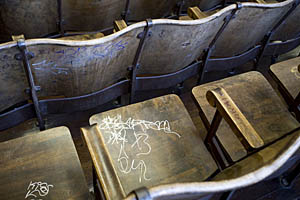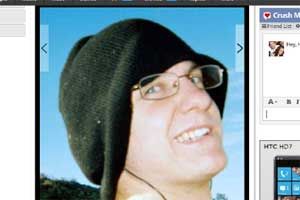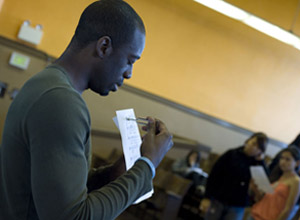
Photo: Mark Murrmann
Editors’ Note: This education dispatch is part of an ongoing series reported from Mission High School, where education writer Kristina Rizga is embedded for the year. Click here to see all of MoJo’s recent education coverage, or follow Kristina’s writing on Twitter or with this RSS Feed.
I’m feeling drained after my conversation with Natalie, but I run into Pedro* on my way home and stop to say hi. “Do you want to see my scars?” he asks me suddenly. He puts his skateboard down on the ground before I can answer and lifts his shirt to show me two deep, long, purple scars—one near his shoulders, another near his lower back. “Gangbangers stabbed me three years ago at Dolores Park,” he tells me matter-of-factly, the way I talk about my tiny knee scar. Except that my tiny scar is from falling off my bike once as a kid in a safe, Soviet neighborhood, where no one I knew ever got stabbed.
What do you say in a situation like that? What do you tell a sweet boy who knows you’re a reporter, whose school you’ve hung around for a month, when one day he decides to pull up his shirt and show you where gangbangers stabbed him and he almost died?
When I got home, I couldn’t write a word. I thought about how different the same Mission High kids look to me after a month immersed in their lives.
Natalie—with her actress looks, stylish clothes, and classroom confidence—seems like an “easy” student at first, someone on a smooth track to graduate on time and go to college. On the surface at least, there’s nothing about her that signals psychological trauma to me, no reason to suspect she’s been kicked out of two charter schools.
And Pedro? For a month, to me he was the guy who liked skateboarding and guitar, the one who knew the answers in class most of the time, and if he didn’t know the answer, still had something witty and smart to say. Only after seeing him four times did I notice some bumps in his temperament. Some days, he just shuts down.
Or take Benton. In my first two weeks at the school, Benton was the classic “challenging” student—someone who texts in class, disrupts lessons, and doesn’t listen to teachers’ requests. Until I saw him last week—engaged, thoughtful, and even polite.
Later that night I had dinner with a visiting friend, an experienced investigative journalist from Latvia. I told her about Pedro’s scars, Natalie’s depression, Benton’s favorite class. “Be careful,” she warned me. “The first thing I learned in journalism school is that you’re responsible for those who get attached to you. Don’t get too close.”
“I know,” I told her, as I picked at my salad. I should be more distant, maintain neutrality. Care a little less about these students. Right? And then I lamented how much more traffic a short blog post about Jared Loughner or the latest tea-party news item gets, when other pieces like this one, this one, this one—or the one you’re reading now—take days of immersive reporting to develop. As we waited for another drink, I checked my Twitter account in silence. But all I could think of was Natalie’s trembling lip, as she sat alone in Ms. Bowman’s class.
*Names changed.
[Next Mission High dispatch: Is Darrell going to flunk this test?]













